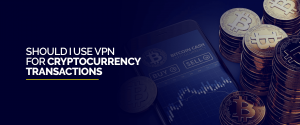

Get 93% OFF on Lifetime
Exclusive Deal
Don’t miss out this deal, it comes with Password Manager FREE of cost.
Get 93% off on FastestVPN and avail PassHulk Password Manager FREE
Get This Deal Now!By Nick Anderson No Comments 4 minutes
Cryptocurrency refers to a digital currency that has no physical presence. Although today you even trade cryptocurrency for physical currency like cash, it is still a digital currency. All cryptocurrencies are based on blockchain technology – a decentralized network where all users verify and keep records of every transaction.

Blockchain was built to prevent tampering with records, providing immutability for transactions. Encryption is a key player, as the name cryptocurrency already implies. With such privacy and security features in place, should you use VPN for cryptocurrency transactions? Let’s take a look.
Blockchain as a concept has been around for decades. The idea is to build a decentralized network where all users (or nodes) share a general public ledger that includes entries of all transactions. It prevents the risk of tampering because any changes to a record would mean alerting all records of the transaction across the network.
It has opened up the freedom to bypass any intermediary like a bank to process transactions and any charges that are usually attached to it. Individuals use online exchanges to trade cryptocurrencies like Bitcoin with other sellers. A wallet is used to store the cryptocurrency, which has its own security to prevent unauthorized access.
Cryptocurrencies are digital currencies created and stored digitally, and they can be used to make purchases. They can even be exchanged for fiat currencies where supported.
Buying and selling cryptocurrency is done through exchanges. There are several wallets out there, and you can choose to encrypt them. We have talked about HTTPS before and how it leverages asymmetric encryption for encrypting communication on the web. The same public and private key pair get used for cryptocurrency.
As we mentioned before, cryptocurrencies like Bitcoin use blockchain technology. It is a network of users (or nodes) interconnected without a central entity serving as a host. Anyone can send you money by encrypting the information using your public key. But, only you can access that information by using the private key.
There is not something substantial a VPN can do here for security as data communication is already encrypted. However, a VPN can improve your privacy.
It’s complicated, but let us explain. Blockchain is built on a distributed general ledger that holds the record of every transaction. The ledger is shared and maintained by all participants on the network. If person A sends money to person B, the transaction will be propagated and stored by everyone on the network and the opening and closing balance of both users. It makes cryptocurrency immutable.
The record will include the digital signature of the two parties for identification, but not the IP address. So, regardless of which network you use, the details will not get stamped in the general ledger.
However, you need to be careful about dealing with exchanges online. Buying and selling some cryptocurrencies are blocked in some countries. Hence, not only can you not access popular cryptocurrency platforms online, you might be penalized for trading. A VPN tunnels your internet traffic and spoofs your IP address so that it can bypass such surveillance set in place by the government.
Due to the decentralized nature of cryptocurrencies, it is a haven for moving illegal money. Some cryptocurrency exchanges require that you go through a process called Know Your Customer(KYS) to prevent money laundering. You will be required to prove your identity before making a transaction. If you do not wish to record your IP address in the process, connect to a VPN server to spoof your location. While this does not improve the security of your coins stored on the exchange, it protects your IP address.
We have talked about public Wi-Fi and its unsecure nature numerous times on our blog. Transactions between you and the exchange is always secure with HTTPS encryption. But anyone on the network could intercept that web activity and redirect you to malicious domains. One possibility is a fabricated domain that looks exactly like the real one but is a trap to steal your login credentials instead. The other possibility is tricking you into download malware like a keylogger that monitors your passwords. So, it could even monitor passwords to the wallet that you have stored offline on your device.
Keeping your cryptocurrency safe is more about adopting the best security practices than using a VPN. Although it certainly helps in some situations, much of the protection will come from practices such as enabling two-factor authentication, using strong passwords and identifying phishing.
© Copyright 2025 Fastest VPN - All Rights Reserved.


Don’t miss out this deal, it comes with Password Manager FREE of cost.
This website uses cookies so that we can provide you with the best user experience possible. Cookie information is stored in your browser and performs functions such as recognising you when you return to our website and helping our team to understand which sections of the website you find most interesting and useful.
Strictly Necessary Cookie should be enabled at all times so that we can save your preferences for cookie settings.
If you disable this cookie, we will not be able to save your preferences. This means that every time you visit this website you will need to enable or disable cookies again.